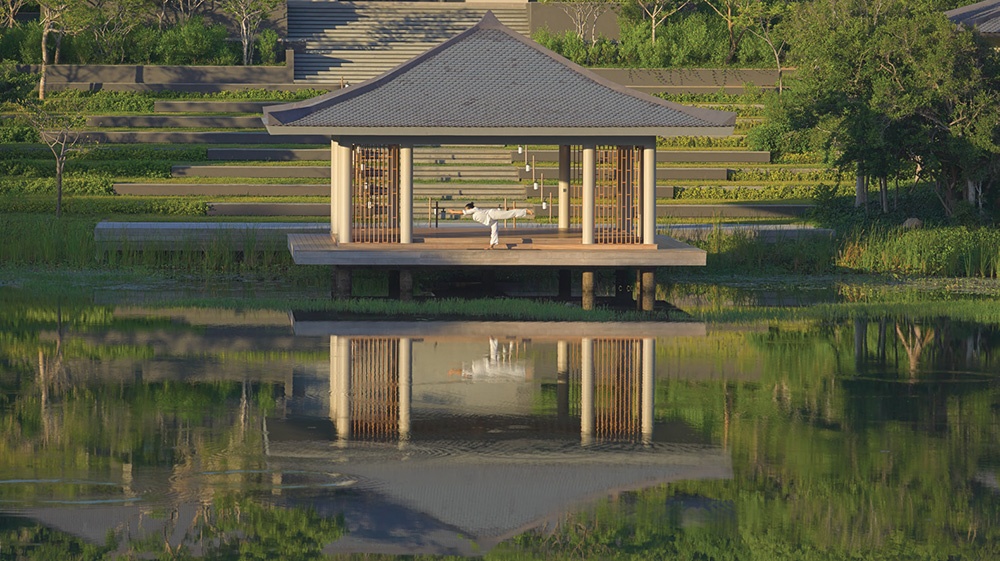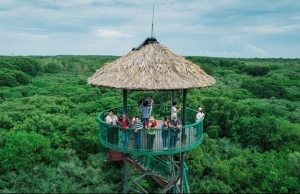Reboot Retreats are on the rise
Two weeks ago, online travel platform Booking.com suggested five destinations in Vietnam for reboot retreaters, including Hoi An, Dalat, Phu Quoc, Moc Chau, and Ninh Binh, based on traveller demand reviews.
 |
| Reboot Retreats are on the rise |
In its Travel Predictions 2024 report released in October last year, Booking.com noted that reboot retreats are expected to be the dominant trend in 2024 and beyond. Some highlighted trends include holidays centred around sleep, romantic getaways for singles, and solo holidays for parents.
The report indicated that nearly two-thirds of travellers from the Asia-Pacific region express a desire to travel solely for a quality, uninterrupted sleep. This trend is particularly prevalent in China, Hong Kong, Thailand, Vietnam, and Singapore.
Many renowned global hotel chains have expanded their sleep care services in recent years, offering more unique wellness and healing experiences for guests.
Four Seasons Resort Bali at Sayan in Indonesia has been offering a Sacred Nap experience for several years, combining hammocks that lull guests to sleep with the sounds of nature.
Elsewhere, Shangri-La Singapore launched a Better Sleep Package in 2023. It is designed to take guests on a two-night immersive restorative sensory journey, centred on helping them reconnect with their inner-self, improve their sleep cycles, and benefit from the restorative powers of a good night’s sleep.
According to HTF Market Intelligence last year, sleep services are becoming an essential part of the wellness and mental health tourism sector with growth rate of 8 per cent per year and is expected to be worth $400 billion by 2028.
In Vietnam, sleep tourism is considered part of the reboot retreat concept and is often integrated into eco-friendly resort models that combine medical treatments and wellness activities such as meditation, yoga, psychological therapy, traditional medicine, and nutritional cuisine.
Dr. Nguyen Thu Hanh, president of the Sustainable Tourism Development Science Union, said that there are many similarities between “reboot” retreats and other types of travel, such as health tourism and wellness tourism. However, reboot retreats focus more on emotional care, soothing the soul, and providing positive energy to travellers.
“Although reboot retreat trends often target small, individual groups, this type of tourism is particularly attractive to international guests and high-spending customers,” Hanh said. “The demand for reboot retreats often peaks in autumn and winter, so it could help address the seasonal issues in the tourism industry in the near future.”
According to CEO of All Asia Vacation (AAV) Nguyen Duc Hanh, who organises trips for billionaires and celebrities to Vietnam, high-end international guests are interested in reboot retreats in Vietnam.
“The combination of natural beauty, historical elements, and local health activities will provide visitors with a truly healing experience when they come to Vietnam,” he said. “However, the percentage of guests specifically requesting reboot experiences when booking services is still low because they prefer to participate in more varied activities.”
Hanh noted that most age groups from 16 and above were interested in reboot retreats. The most interested group is aged 45-60 with stable financial conditions but often faces pressures related to economics, status, health, or ageing.
Activities that reconnect with nature, such as planting trees in mangrove forests, hiking at sunrise, or simply walking barefoot and swimming in the sea, are also emphasised by the AAV to meet the reboot needs of travellers. Yoga is also used in reboot exercises to guide clients towards positive thinking and genuine relaxation.
“We also have many resources for mental healing, such as drinking tea, practising Buddhism, or even Vietnamese food, which is lighter and fresher compared to Western food,” Hanh said. “However, to become a leading destination for reboot retreats, Vietnam needs to standardise safe treatment methods to build trust with international guests. Promoting sustainable tourism activities and investing in training for local professionals is also crucial for the development of this tourism type.”
Meanwhile, Vietnam Detox considers reboot retreats a promising industry, but notes that Vietnam is still slow in exploiting this opportunity. Vietnam’s competitor, Thailand, has developed resort models collaborating with hospitals to accommodate post-surgery recovery guests for many years.
The company offers reboot trips that include meditation, hot spring bathing, art appreciation, forest walks, and health classes.
Founder Dieter Buchner asserts that the demand for healing experiences among Vietnamese guests is comparable to that of international tourists. “Currently, 99 per cent of our clients are Vietnamese, willing to spend $605-1,000 for a course lasting about 5-8 days, with limited participants,” he said.
Buchner added that many resorts in Vietnam have begun to position themselves as retreats rather than mass-market accommodation, such as some hot spring resorts in Quang Ninh or resorts in Phu Yen.
“Completely secluded, tranquil retreats close to nature with a few rooms can encourage visitors to stay for five to seven days, whereas conventional resorts may become boring after two or three days,” he said.
 | HCM City highlights local cultures to ignite urban tourism Ho Chi Minh City’s tourism sector has actively brought its indigenous culture into urban tourism, considering this as one of the strategies to promote the strengths of the city’s destination network. |
What the stars mean:
★ Poor ★ ★ Promising ★★★ Good ★★★★ Very good ★★★★★ Exceptional
Related Contents
Latest News
More News
- Vietnam ranks second among Chinese travellers’ top destinations (January 14, 2026 | 11:59)
- Visa data highlights five key payment and travel trends in Vietnam for 2026 (January 14, 2026 | 10:42)
- New Year tourism receipts top $40m in key cities (January 06, 2026 | 08:36)
- Vietnamese passport climbs on global ranking (December 16, 2025 | 08:00)
- Manila becomes a new check-in destination for Vietnamese youth (December 11, 2025 | 18:07)
- Vietjet launches mega year-end ticket promotion (December 10, 2025 | 11:33)
- Dalat leads Vietnam’s 2025 search trends (December 09, 2025 | 13:44)
- Vietnam welcomes record wave of international visitors (December 09, 2025 | 13:43)
- Vietjet launches daily Manila flights to celebrate year-end festive peak season (December 05, 2025 | 13:47)
- The destinations powering Vietnam’s festive season travel demand (December 04, 2025 | 18:33)

 Tag:
Tag:



















 Mobile Version
Mobile Version